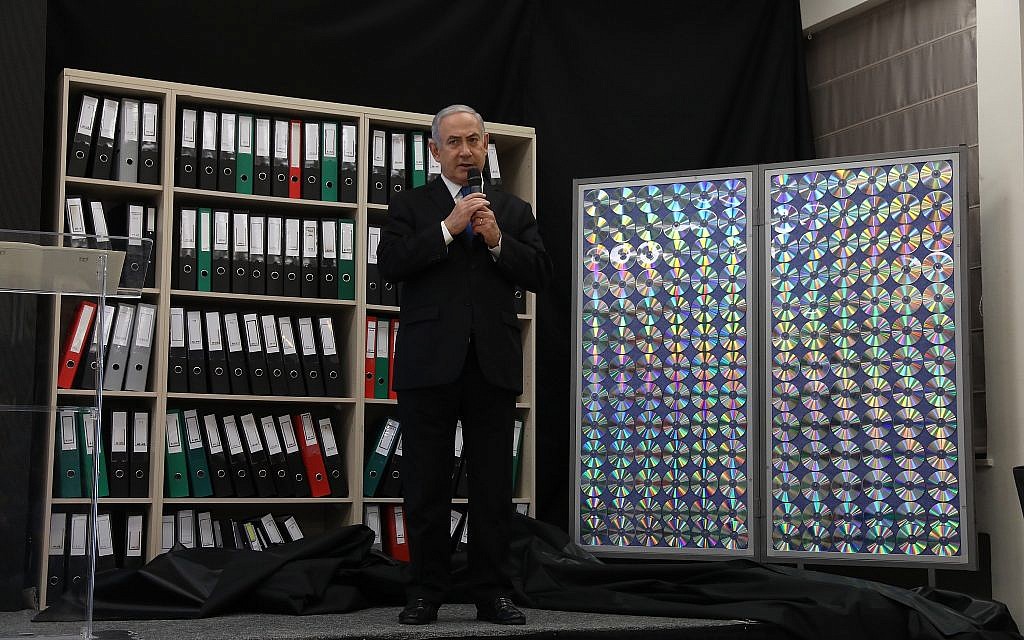Netanyahu: Iran ‘brazenly lied’ about nuclear program, continued work after deal
Prime Minister Benjamin Netanyahu accused Iran of lying about its nuclear program in a speech broadcast live Monday, revealing information he said showed the Islamic Republic had for years worked on developing nuclear weapons, and continued to pursue such weapons even after signing the 2015 nuclear deal with world powers.
The premier, who has repeatedly called for the accord between world powers and Iran to either be altered or scrapped, said Israel had obtained 100,000 secret Iranian files “a few weeks ago in a great intelligence achievement.”
Speaking in English at the Defense Ministry in Tel Aviv, Netanyahu gave a presentation including videos and slides he said exposed Iran’s nuclear dossier.
“You may well know that Iran’s leaders repeatedly deny ever pursuing nuclear weapons,” he said, before playing clips of Iran’s supreme leader, president and foreign minister denying the country ever sought such capabilities weapons.
“Iran lied. Big time,” said Netanyahu, adding that the trove included a half-ton of material.
The cache, he said, contained “incriminating documents, incriminating charts, incriminating presentations, incriminating blueprints, incriminating photos, incriminating videos and more.
After Netanyahu’s speech, Trump says ‘I’ve been 100 percent right’ on Iran
Shortly after Prime Minister Benjamin Netanyahu’s speech detailing covert Iranian efforts to build a nuclear program, and with less than two weeks before his deadline to exit the nuclear accord with Tehran, US President Donald Trump on Monday said the deal was “unacceptable” in its present form.
Responding to Netanyahu’s broadcast in which the prime minister revealed that Israel had obtained 100,000 secret Iranian documents pertaining to the program, Trump said, “What’s happening today and what’s happened over the last little while and what we’ve learned has really shown that I’ve been 100 percent right.
“That is just not an acceptable situation, and I’ve been saying that’s happening,” he went on in the White House Rose Garden, alongside Nigerian President Muhammadu Buhari. “They’re not sitting back idly; they’re setting off missiles, which they say are for television purposes? I don’t think so.”
The American leader also declined to share whether he’s decided to walk away from the landmark agreement by May 12, the next deadline to waive sanctions against the Islamic Republic under the deal. Trump last signed those waivers in January, but he said he would not again unless Congress and European allies amend the pact.
“We’ll see what happens,” he said. “I’m not telling you what I’m doing, but a lot of people think they know. On or before the 12th, we’ll make a decision. That doesn’t mean we won’t negotiate a real agreement. You know, this is an agreement that wasn’t approved by too many people, and it’s a horrible agreement for the United States, including the fact… that we gave Iran $150 billion and $1.8 billion in cash.
“You know what we got?” Trump continued. “We got nothing. That doesn’t mean I wouldn’t negotiate a new agreement, we’ll see what happens.”
The Duplicitous Diplomat: Seven Deceptions Iranian FM Zarif Told Face the Nation
4) “We never wanted to produce a bomb.”
Later on Zarif reiterated this, saying, “Iran commits itself never to develop a nuclear weapon.”
In fact, a 2007 National Intelligence Estimate assessed that Iran had sought to develop a nuclear weapon until 2003. The IAEA, in 2015, prior to implementation of the nuclear deal in January 2016, determined that Iran was attempting to design a nuclear weapon at least until 2009. Iran also failed to answer all of the questions asked of it about its nuclear program by the IAEA prompting The New York Times to observe, “Iran’s refusal to cooperate on central points could set a dangerous precedent as the United Nations agency tries to convince other countries with nuclear technology that they must fully answer queries to determine if they have a secret weapons program.”
Iran has tried to develop nuclear weapons in the past and no matter what’s written on a piece of paper (that Iran never signed), Iran can be expected to do so in the future.











































